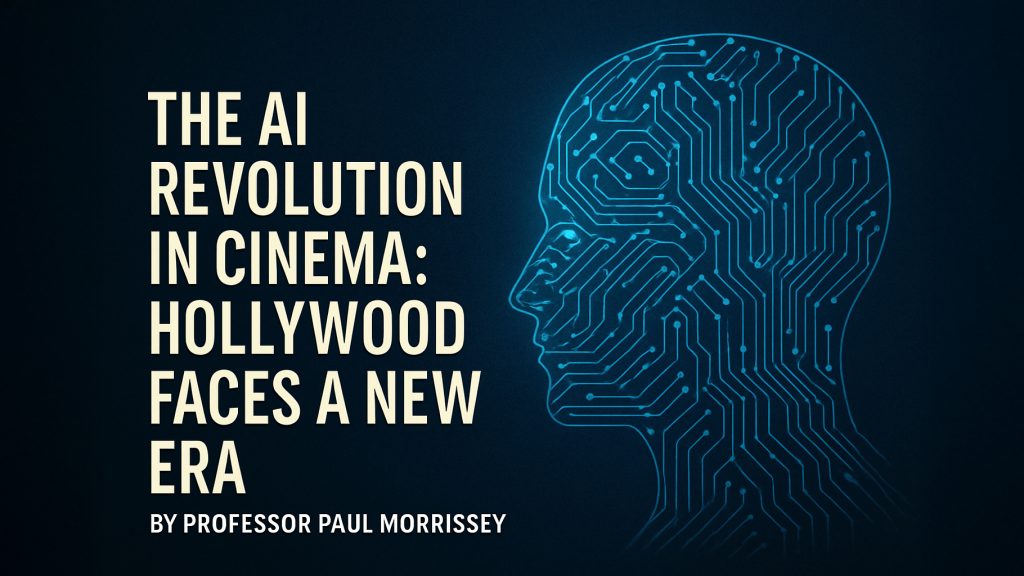Artificial intelligence is ushering in a transformative era for the global film industry. Once a realm dominated by major studios, expert technicians, and high-budget productions, the landscape is changing rapidly. Today, AI-driven tools are enabling individuals with modest skills and basic technology to create high-quality, cinematic content. This democratisation of production is not only disrupting traditional workflows—it’s challenging the very foundation of Hollywood’s long-held dominance.
Hollywood’s Role as a Creative Powerhouse
For over a hundred years, Los Angeles has served as the headquarters of a global entertainment empire. According to the Motion Picture Association, the film and television sector directly employs over 165,000 people in the region and supports more than 2 million jobs nationwide. In 2024, global box office revenues from Hollywood releases surpassed $30 billion, and that figure represents just a slice of a much larger revenue ecosystem including licensing, merchandising, music, and streaming services.Hollywood’s impact is not just economic—it’s cultural. Its productions shape global narratives, influence fashion and trends, and act as a platform for new technologies. While movie theatre attendance has declined by 40% since 2019, the rise of streaming platforms has provided alternative models for content delivery and monetisation.
An Industry Fueled by Technological Progress
The film industry has always embraced innovation. From the early days of silent films to the latest in CGI and immersive sound technologies, Hollywood has consistently adapted to enhance storytelling. Each technological leap has typically been additive—bringing new tools, expanding creative boundaries, and increasing opportunities for workers in the industry.
However, artificial intelligence represents a different kind of advancement—one that may subtract rather than add.
AI Reshapes Creative Work
Unlike previous innovations, AI has the potential to replace rather than support human roles. Tools powered by AI are now capable of generating music, writing scripts, editing video, designing visuals, and completing post-production work—often faster and at lower cost than human professionals. These advancements are already impacting job availability across the entertainment ecosystem.
The threat is not hypothetical. In 2023, both the Writers Guild of America and the Screen Actors Guild held significant strikes, pressing for restrictions on the use of AI in content creation. Their efforts resulted in limited agreements, highlighting the growing influence of AI in the industry.
The Challenge of Maintaining Relevance
Perhaps the biggest question AI raises is not about employment but about relevance. Can Hollywood continue to matter in an age where anyone can produce compelling content?
Since its launch in 2005, YouTube has shown how platforms can shift control from centralised studios to individual creators. AI is accelerating that trend by removing the need for advanced skills and expensive equipment. Tools like Midjourney, Google Veo3, and Kling now enable users to create short but high-quality video sequences using only plain text prompts. Although these tools currently produce brief clips, rapid improvements suggest that full-length films may soon be within reach of everyday creators.
A case in point: during the 2025 NBA Finals, a national commercial created entirely with AI aired on television. The project was completed in three days at a cost of $2,000—compared to the weeks and hundreds of thousands of dollars a traditional production would have required.
A Glimpse Into the Future
Imagine a world where anyone can make a feature-length film by simply describing a plot. AI systems could handle everything—from scriptwriting to directing, acting, editing, and scoring. Disliked a movie ending? A revised version could be generated instantly.
Startups like Fable’s Showrunner are already providing platforms for users to create episodic content driven by AI. These innovations hint at a future where interactive, user-tailored narratives become commonplace.
For independent creators and small businesses, the opportunity is unprecedented. But for traditional studios, the road ahead demands reinvention. Without it, the relevance and scale of Hollywood as we know it could dramatically diminish.
Skeptics may argue that AI lacks the imagination and depth of human creativity. That remains to be seen. Today’s AI can already analyze and mimic the styles of acclaimed directors and writers, empowering users to generate content in their image.
Hollywood’s Crossroads—and a Warning to Other Industries
Hollywood is now at a crossroads. If it hopes to retain its leadership, it must innovate boldly and reimagine its role in an AI-driven creative economy. Other industries should pay close attention: the disruption playing out in the entertainment sector offers a preview of what lies ahead for them.
The age of intelligent content creation is here. The question is—who will lead, and who will be left behind?
— Professor Paul Morrissey August 2025

